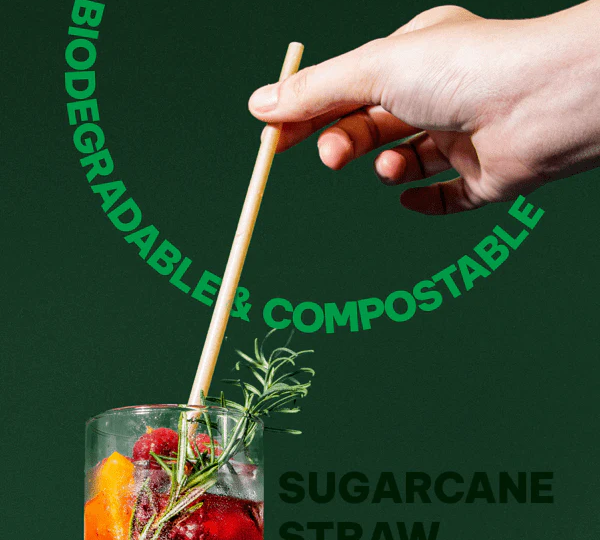In an era where environmental consciousness is paramount, sugarcane straws stand out as a sustainable choice in the global market, including countries like Vietnam, China, India, Australia, Canada, and Taiwan. This article explores the creation of sugarcane straws, their composition, and the ecological advantages they offer.
Composition of Sugarcane Straws
Sugarcane straws are crafted from 100% sugarcane bagasse – the fibrous byproduct of sugar extraction. Rich in hemicellulose, cellulose, pectin, lignin, fats, minerals, vitamins, protein, and dietary fiber, sugarcane bagasse is an innovative material that not only utilizes otherwise wasted resources but also aids in environmental protection. These straws are unique for being tasteless, sugar-free, biodegradable, and boasting a natural light brown hue with speckled patterns. They’re reusable multiple times within a day and are completely compostable. For an in-depth look at EQUO’s Sugarcane Drinking Straws, visit EQUO’s product page:
>> Biodegradable Sugarcane Straws for Drinks: How are Sugarcane Straws Made?

How are Sugarcane Straws Made?
The journey of making sugarcane straws began as sugar manufacturers sought ways to manage the bagasse byproduct. Realizing its potential as a biodegradable alternative to single-use plastics, they innovated a process to transform this excess material into valuable products like straws. This process is eco-friendly, generating no significant carbon emissions. The bagasse is ground into powder, mixed with water to form pellets, and then shaped into straws. The final steps involve specialized shaping and packaging, ensuring the delivery of high-quality sugarcane straws to the market.

Can You Eat Sugarcane Straws
Sugarcane straws, while biodegradable and compostable, are not fit for human consumption. They degrade within 3-6 months in soil or compost bins, making them an eco-friendly option. EQUO’s sugarcane straws, in particular, offer a rustic aesthetic and a sweet brown sugar scent, enhancing the beverage experience. These straws are suitable for a variety of drinks and are safe for both adults and children. Though not edible, they’re 100% natural, free from plastics and chemicals, and can be reused several times in a day.
Global Manufacturers: United States, Vietnam, China, India, Australia, Canada, and Taiwan,..
EQUO, as a leading manufacturer and supplier, proudly offers high-quality Sugarcane Straws, distributing to over 20 countries, including the United States, Vietnam, China, India, Australia, Canada, and Taiwan. Whether for wholesale or retail needs, EQUO’s commitment to quality and sustainability makes their sugarcane straws a top choice in the eco-friendly products market.
Other Eco-friendly Choices for Biodegradable Drinking Straws
If you like environmentally friendly straws, the following products are also great options you can refer to!
- Grass straws: Made from natural grass, offering an eco-friendly option.
- Rice straws: Produced from 100% rice and tapioca starch, colored using natural vegetable and fruit juices, and biodegradable, ensuring safety.
- Coffee husk straws: Crafted from coffee husks, they are 100% plastic-free, home-compostable and have a relaxing aroma of coffee.
- Sugarcane fiber straws: Made from sugarcane fiber, with a mild, sweet aroma and biodegradable properties that won’t alter the taste of your beverage.
- Coconut straws: Manufactured from 100% fermented coconut water, they are highly flexible, do not dissolve in liquid.

All of these options are made from 100% plant-based materials and can fully compostable in the environment within 3-6 months. These straws not only protect the environment but also ensure consumer safety and are suitable for a wide range of beverages. EQUO is proud to provide all of these alternative solutions to replace traditional plastic straws, contributing to a cleaner environment.








